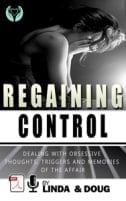 Note: This is the last installment of a multi-article series from our friend Tim Tedder, a licensed counselor in Winter Park, Florida. The series will address ways to find relief from intrusive thoughts, conversations or obsessive focus about the affair.
Note: This is the last installment of a multi-article series from our friend Tim Tedder, a licensed counselor in Winter Park, Florida. The series will address ways to find relief from intrusive thoughts, conversations or obsessive focus about the affair.
This series has covered these eight strategies:
- Take 3 steps toward controlling your affair conversations.
- Turn cages into clouds.
- Redirect negative thoughts.
- Start a Flip Journal™.
- Create a Sleep Story.
- Release your grip on the past.
- Increase your support.
- Seek help from an EMDR counselor.
In the first article of the series, Tim covered strategies 1 and 2. In part 2 Tim tackled strategies 3 and 4. In today’s article, Tim wraps things up by addressing the final four strategies for dealing with the obsessive thoughts.
We wish to thank Tim very much for contributing this awesomely helpful article series!
Strategy 5: Create a Sleep Story
The thought-changing principle used in the previous strategies can also be used as a means of addressing the problem of interrupted sleep. During times of stress, many people experience the frustration of not being able to fall asleep due to intruding thoughts or obsessive focus about the affair. The lack of sleep makes them more vulnerable to stress, which results in more stressful thinking, which keeps them from sleep… and so the cycle feeds itself.
There is a remedy, based on the understanding that you cannot focus your thinking on more than one thing at the same time. You may certainly be aware of multiple ideas or inputs at any one moment, and can even switch quickly from one to another, but once you focus your attention on one matter, the others move to an “on hold” position. Instead of trying not to think about certain things or willing yourself to sleep, turn our attention to an alternative thought, one that creates a context for rest. Create a sleep story.
A sleep story is a vivid, moving mental experience that results in positive emotions consistent with restfulness: peace, contentment, happiness, love. Because intrusive thoughts can be so powerful, any sleep story that you create needs to be strong enough to fully engage your imagination. Once you create that kind of story and practice using it, it becomes a doorway to sleep.
 How to Create Your Story
How to Create Your Story
Your mind actually wants to rest. Once you create a restful context, sleep will happen naturally. Here are the steps I recommend:
- Identify potential sleep stories.
Find a place where you can be quiet and alone for at least 30 minutes. Starting from your childhood and moving into your adult years, recall the memory anyplace or event that produces a positive emotional response in you (your room as a child, a favorite play area, hiding place, special vacation, significant achievement, being with someone you loved, etc.).
Write down a 1-line description of each place/event you recall. Now think of any stories you know that produce these same kinds of feelings (favorite childhood stories, favorite adult book, favorite movie, Bible story, etc.). Write down a 1-line description for each story you think of.
Finally, give attention purely to your imagination in considering paces/events that would produce positive feelings (a place you always wanted to visit, an alternate reality, being someone else or having special abilities, anything you enjoy thinking about) and write these down as well.
- Choose your first sleep story.
Look through your entire list and pick one place/event to use for your first sleep story. Save the list, since you may want to create additional stories later.
- Let your story become a sensory experience.
Find another time when you can be alone and quiet. Put soft music on, if that helps. Begin to think about the place or event you chose and turn it into a vivid, active story by using all 5 senses to imagine each and every possible detail in your image.
SIGHT: Turn around and look at everything where you are. If there are windows, look out of them. What do you see? What are the colors? What things are close? What things are far away? Pick up something and look at its details.
SOUND: What do you hear? What sounds are close to you? What sounds are far away? Imagine each of them separately and then try to hear them together.
TOUCH: What can you touch, or what is touching you? What does it feel like? Touch all of the objects around you and be aware of the feel of the air or anything else that makes contact with you.
SMELL: What are all the smells? Can you imagine what they smell like?
TASTE: Is there a taste in the air? Is there anything around you that you can taste?
- Turn the story image into story action.
This is where your story begins, but where it goes is up to you. If you are imagining a real event, you may choose to recall the actual story as it happened, or you may want to create a new story based on the old reality. If your story is completely imaginary, then you are free to take it anywhere you want it to go. Keep your imaginary senses involved and direct the story in ways that are enjoyable for you. Feel free to explore; it’s your world.
Note: If this is your first story, you may find it easier to start with recalling an actual event so that you don’t get stalled in the story. If your story stops, obsessive thoughts will exert their power again.
- Create a simple symbol for your story.
Create an imaginary image of the book that contains your sleep story. This may seem silly, but it’s important. Think of one object or symbol that represents your story. Any simple image will do (e.g., a ring, tree, bird, chair, person, sun, sign, ticket, etc.). Place this object on the cover of your imaginary book. Now open the book and look at the opening page. The picture you see there should be the image of the place/event that starts your story.
 How to Use Your Story
How to Use Your Story
The next time intrusive thoughts threaten to keep you awake at night, follow these steps:
- First Step: Relax your body. Lie on your back. Tense your body and then slowly relax, while you imagine your body settling down into the mattress. Take 5-10 deep breaths, breathing in through your diaphragm (your stomach, not your chest, rises and falls with each breath) and letting each breath out slowly.
- Second Step: Focus on your book cover image. That image is the object you use to initially focus your attention away from intrusive thoughts. Anytime you feel yourself slipping back toward negative thinking, quickly bring that image to mind and choose to focus on the book instead.
- Third Step: Now, open the cover of the book and see the picture there. Allow yourself to move into the picture and, using all your imaginary sense, experience the beginning of your story…
This will take some time and practice, especially if you have been struggling with intrusive nighttime thoughts for weeks or months. But don’t give up. The more you practice experiencing the imaginary details of your story, the easier it becomes to maintain your involvement in the story. As long as you keep your attention there, obsessive thoughts lose their control. In time, you’ll find that the last thing you remember before falling to sleep is the experience of your sleep story.

Arm yourself with a variety of techniques, practical strategies and knowledge to help you to manage those intrusive thoughts, triggers and memories of your partner’s affair.
Strategy 6: Obsessive Focus about the Affair – Release your grip on the past
Sometimes the past won’t let go of us because we refuse to let go of the past. A betrayed partner who stays stuck in the pain may still have more work to do in the area of forgiveness.
Forgiveness does not forget the past. Forgiveness does not condone the past. Forgiveness does not grant instant trust. Rather, forgiveness fully recognizes the pain and injustice that has occurred (and will be felt for a long time) but chooses to let the offense remain in the past.
Forgiveness stops dragging the past into the present as a means of shaming, condemning, or manipulating. Forgiveness is often an act that heals the forgiver more than the forgiven.
If your thoughts often lead to anger, you may have to consider what it means to fully forgive.
I’ll be covering this issue more specifically in a future article, but the following content may provide some more insight into the important process of forgiveness: http://affairhealing.com/forgiving-an-affair.html
 Strategy 7: Increase your support
Strategy 7: Increase your support
When I meet a recovering couple who has kept their affair a secret from everyone, I express concern over the limit of support available to each of them, especially the betrayed spouse.
The level of comfort and encouragement needed is usually more than their broken relationship can provide. My counsel, without exception, is for each of them to find at least one other supportive, trustworthy person and talk to them honestly. Choose someone who will respect your confidence and encourage you in healthy directions.
This may be a family member, a friend, a religious leader, a counselor, or a support group… or all of the above! You need this.
Be brave enough to ask for help, vulnerable enough to tell them when you need them, and respectful enough to guard against over dependence. A close friend or family member might not mind you talking every day, but use the other coping strategies in this article to sustain you as you take deliberate breaks between conversations. Don’t cling too strongly to either dependency or self-sufficiency; find the balance between them.
Strategy 8: Seek help from an EMDR counselor
EMDR (Eye Movement Desensitization and Reprocessing) is a therapeutic approach that enables people to heal from the symptoms and emotional distress resulting from disturbing life experiences. If you find yourself recalling certain traumatic events related to the affair, you may find significant relief with help from an EMDR therapist. An online search for a trained EMDR counselor will likely turn up a number of results in your area.
The service of a trained counselor will be most beneficial, but if this is not an option for you, consider reading the book, Getting Past Your Past: Take Control of Your Life with Self-Help Techniques from EMDR Therapy by Francine Shapiro (the founder of EMDR therapy).
One final word…
It can be especially difficult to become unstuck from negative thinking when a marriage ends as a result of an affair. I once had a client whose husband continued to chose the other woman. My client struggled with constant thoughts of shame, fear, and hopelessness.
After one email exchange, I responded with this message:
“I know you are in a very hard place and dealing with tremendous pain & uncertainty. Honestly, I wish I could do something to change this for you because I do care about you and want you to be experiencing something different. But what you want, he is not willing to give you. He has made other choices. You cannot change his heart and mind.
“Now you have to take responsibility for what is happening. Things are staying stuck not just because he cannot or will not change, but because the same is true of you, too. (You know me well enough, I think, to know I do not say this in harshness or judgment, but with softness and sorrow.)
“When you can face your fear and walk through it, you will begin taking charge of your life. Will there be pain? Yes. Is there uncertainty. Yes. Are there guarantees? No… except for this: once you determine that you have the capacity to make choices that are right for you and refuse to be trapped in someone else’s destructive cycle, then you will become unstuck. Then you will be motivated by something so much better than fear.
“You do not have to be a victim anymore. You have a choice in this. Whether or not you can see it, there is hope for something on the other side even if you are without him.”
After more work, she was able to write this:
“When I think how sad I was a month ago at this time & how happy I am right now, it’s hard to put it into words but I think you know what I’m trying to say. It’s all those things we’ve talked about so many times… especially having hope. Thanks for always encouraging me.”
Reader, I hope you are encouraged, too.
Resources recommended in this article:
Total Truth Talk Guidelines:
Guidelines for the Affair Spouse
Guidelines for the Betrayed Spouse
Article: The Need for Answers
Book: The 10 Best-Ever Anxiety Management Techniques by Margaret Wehrenberg
Article Series: Forgiving an Affair
Website: A description of EMDR counseling
Book: Getting Past Your Past: Take Control of Your Life with Self-Help Techniques from EMDR Therapy by Francine Shapiro
Thanks again Tim for the great article series!
Here are the links to the previous two articles again:
 Tim Tedder, LMHC, NCC
Tim Tedder, LMHC, NCC
Tim is a Licensed Mental Health Counselor and a Nationally Certified Counselor with a passion for helping couples in crisis. Please check out his courses for healing, change and renewal.
9 replies to "Obsessive Focus – Relentless Thoughts or Conversations About the Affair – Part 3"
I was wondering how important getting more support really is. Because of current financial problems, and difficulty in finding childcare for a very clingy 1 1/2 year old (who has had to be picked up from daycare because he would not stop crying, to the point of throwing up), paying for help is not really an option. I have one family member I have confided in, but otherwise have just looked online and been reading books to help me. My CS is the “just get over it, you said you forgave me, stop talking about it” type, and it is almost impossible to talk to him about anything. Even trying to change my tone and choosing my words carefully doesn’t help if I am trying to talk about anything he doesn’t want to talk about. I have already had to leave him twice before because of not being able to work through things and communicate with him or get him to put me or our family first, even when my health, and life, was on the line. I had finally felt that I had fully forgiven him for the past and had a lot of hope for our marriage when I found out about his unsavory online activities, which he refused to admit to at first, until I told him what I’d found out. I had initially stayed for my children’s sake, and because I had left my job so as to take care of our new baby, and believed that separating again was going to put my family into huge turmoil and greater financial difficulty when it looked like it was a situation that could finally be used to improve my marriage. But after almost 15 months of feeling constantly disappointed at my husband’s minimal efforts and excuses (typical of his past efforts), as well as how obvious it is to me that I have to heal myself without counting on him for anything that isn’t virtually effortless, I feel that my only focus should be on healing myself, and on what I want to do with my life. I don’t feel trust for my husband, and now question things that I had accepted before. I don’t feel I can have much of an emotional bond with him, and don’t really feel that I love him anymore. Being around him and waiting for him to show me the love and desire he says he feels for me just hurts my self-esteem further. I understand that he really doesn’t have time to dedicate much of it to me because he does have to work two jobs. The sad part to me is that I have felt that I have to pretend to be happy and in love with him all the time to get him to make any effort, and I am just tired of that. I don’t want to have to pretend with him, too, as I have to with everyone else. I have questioned frequently if I really have to live the rest of my life like roommates with my husband, who has always chosen to put friends, acquaintances, and other family members ahead of us. Even though he has made some small changes, I often wonder if, after I have regained some of my self-esteem and our financial picture isn’t so grim, I will find that I have wasted most of my life on someone who doesn’t deserve or appreciate me. So I don’t know if getting more help will mean that I will be expected to try to influence my husband so that he will match my efforts, or if I would get talked into leaving him, since my current reasons for staying are the consequences for my children and me if I divorce, as well as believing that divorce is not something God really wants for anyone. So I feel I am trying to do what’s right by staying, even though it’s not want I really want personally. And I don’t know how much I want someone pushing their own beliefs and agenda on me in the guise of helping me. Is it obvious I have a lot of trust issues now?
I recently started EMDR therapy. I have only had three sessions so far, but it has been helpful. There are at least a couple of particularly traumatic events related to my husband’s EA that I am getting closer to feeling merely sad about rather than feeling the very real pain and anguish as if they are happening now that I was experiencing. It isn’t an overnight solution, but I feel like I am making significant progress in the direction of healing. I have hope for the first time in a long time.
Today was difficult. After 25 months since DDay I was severly triggered by something my husband said on the phone. He has been in Seattle, where we were livng during his EA, the last 2 weeks on business. He has been staying with the people we rented a small basement apartment from at the time of his affair. He actually brought the OW to the apartment a couple of times before I was there. (I was temporarily in another state helping a family member when the move happened. Long story.) He told me that today before he left he went into the apartment bedroom and felt so grateful that inspite of everything, we had shared a moment of clarity in that room that we both wanted to stay together and work on our marriage. To him it was a “sacred place.” When he said that I wanted to reach through the phone and choke him. I am really glad we decided to try to make our marriage work, but the deep pain, the hell that I went through in that apartment are in no way sacred. I would be fine to burn the place to the ground.
It is staggering that after several weeks of only mild to no triggers to be thrown right back into the vortex of despair and agony that his emotional affair created in my life. However, even just a few months ago I would have been disabled by that trigger. While it has been painful I have been able to stay in the present for the most part and not crumble. I attribute that directly to the baby steps of progress I’ve taken in EMDR therapy.
When my husband is back on Sunday I will definitely make it clear to him my feelings about that apartment and the house it is in and how offensive and hurtful it was for him to call the room (in which I received what was the worst news of my life) a sacred place.
Trusting God, thank-you for sharing your very personal and real feelings. Like you, I have only shared our situation with one friend and have frankly found most of my support and progress in books, articles, and most importantly and profoundly this website. There are many people here who can empathize with you and I have read hard won profound wisdom from several people who are further along in their healing than you and I. I wish you the very best. There is hope.
These ideas are very helpful though Trustingod made a good point when she pointed out that in order for the relationship to truly move forward the other partner needs to be invested full too. I’m only 6 months into learning about my husband “on and off” again 12 year EA to one woman and coping seems almost impossible at times though I don’t feel so crazy as I did months ago.
I am trying to stay here for our three beautiful children and attend individual counseling and marriage counseling though he has been unable to be there to help me recover emotionally. He moved out immediately after I learned of the EA. He returned to the home two months later though he’s physically present, emotionally he is unable to discuss the EA, the dynamics on a emotional level. I want to have details in hopes to prevent it and he believes it’s to “punish” him.
I agree that replaying the details can be harmful though I also believe we were o out of the loop and need to try to wrap ur head around what happened that some details are necessary for recovery and prevention.
I am unsure if we will remain married though I know I will recover- I am prepared to be in counseling for years and be;live it will take a long investment of time. I am heart broken and never believed my best friend and husband would have caused this harm on myself and our three children.
Tryingtorecover,
I totally understand you when you say you have had a hard time believing your husband could be capable of this. It was the one thing that I thought my husband would never do, because I had already had to forgive so many other things, and thought that he finally realized that he could actually lose his family, and that he needed to invest in us. But instead, he decided he could do better, and wanted women younger and prettier than me. He has been my only friend for twenty years, and now if it wasn’t for my children, then I would sincerely wish to have never met him. I have hope that I will be better someday, but not much that I will be able to stay with him for much longer.
TrustingGod- I feel like we’re living parallel lives. I am still married- 19 years and we were together for 21 years. He did many other things too where I believed this was a boundary he wouldn’t cross. His father had a PA on his mother and his second wife and promised he would never do this- as he knew how it affected the family……I believed and trusted him. He too knew he could lose his family as this was a woman I said was bad news and would give him gifts and I requested he not talk to her. He responded with he didn’t need to listen to my “rules” and she was his friend….low and behold… a friend indeed. One that they both shared “I love you” and “we should have been together” and now here we are suffering- my children and myself.
Thank you for reaching out and sharing your story- I’ve felt so alone and looked for a support group locally- to no avail. This site has helped tremendously.
I’ve just read the the Obsessive Focus topic, AGAiN!
(And, yes, there are many things I’ll read more than once. It includes anything, fiction, non- fiction, forum posts, articles, and on and on)
This topic is now on my Top 10 list. And it’s not just Tim’s words. The reply posts were exceptional. Insightful, heartfelt, wise, compassionate.
Thank you. Doug and Linda you’ve nailed it again.
My fellow members, so have you.